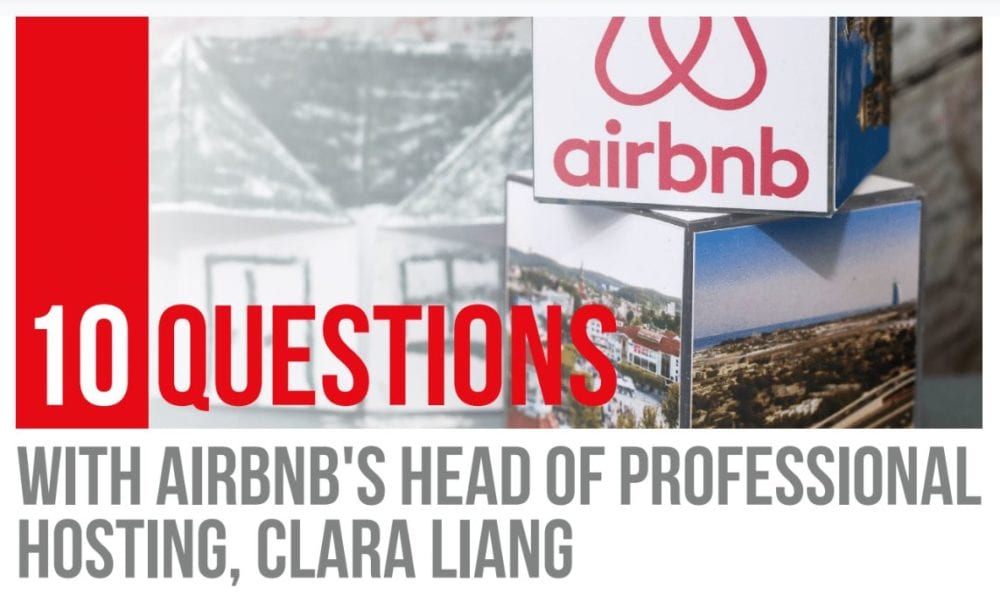Airbnb currently offers 5 million listings in 191 markets (compared to HomeAway, which lists 1.6 million properties). Growth rates at Airbnb have been extraordinary, as it has added tours and activities (“experiences”) and boutique hotels to the platform and is expected to add other travel verticals in the future. The company is now ten years old, valued at $35 billion, and likely to become publicly traded in the next 18 months.
But the macro overview of the company is only part of the story for its professional suppliers, or as Airbnb refers them, “professional hosts.”
While Airbnb has been extremely successful in many vacation markets, the company still represents a small share of supply in traditional US markets such as North Carolina, South Carolina, Alabama, and the Florida Panhandle. According to data provided exclusively to VRM Intel by Beyond Pricing, in May 2018, on the Alabama Gulf Coast, Airbnb listed 1,543 units on its site, while HomeAway listed 13,633. In the Florida panhandle, the story was similar. Airbnb listed 3,544 units on its site, while HomeAway offered 26,167.
For professional vacation rental managers, the decision to list homes on Airbnb is multi-faceted, based on target demographics, feeder market types, percentage of direct/repeat bookings, connectivity, need for guest communication, and merchant of record requirements. In the winter issue of VRM Intel Magazine, we will take a deeper dive into these considerations across channels.

We reached out to Clara Liang to find out more about how Airbnb is viewing working with “professional hosts.” Liang leads the Professional Hosting team for Airbnb’s Homes business, and is responsible for growth, retention, and success for professional hosts on Airbnb. She is a technology leader with over 15 years of experience across enterprise B2B and consumer technology companies. Prior to Airbnb, Liang served as chief product officer at Jive Software leading product management and design for Jive’s enterprise collaboration solutions. She has also held a number of leadership positions at IBM across product management, engineering, technical services, and design. Her educational background consists of a B.S. in Symbolic Systems and a minor in Chemistry from Stanford University, as well as an M.S. in Technology Commercialization from the University of Texas.
Amy Hinote (AH): Why do property managers want to work with Airbnb? What are you hearing and learning from these hosts?
Clara Liang (CL): Property managers have told us that Airbnb brings them new guests from all over the world and helps them reach different demographics. Access to Airbnb’s massive, rapidly growing community is definitely a key motivation for working with us. Equally important is the inspiration we get from a property manager’s commitment to hospitality. We have shared goals in providing personalized, delightful guest experiences, and by partnering with property managers on providing this premier hospitality, we’re able to help them grow and scale their businesses.
AH: To what do you attribute Airbnb’s consistent outpacing in vacation rental growth, and what do you see as Airbnb’s differentiators compared to competitors in this space?
CL: Our biggest differentiator is building and fostering relationships as a partner instead of as a channel. We’re working day in and day out to support the creation of new businesses, and we help current businesses deliver better, more unique, and more magical stays. Our number one goal is to support our partners in growing their businesses. We don’t want to commoditize them, we want to showcase, enable, and help them.
AH: Are there particular emerging markets you see contributing significantly to inventory growth now and in the near future?
CL: With more than five million listings in over 191 countries, we’re focused on worldwide growth. For us, it’s less about a geographic focus and more about supporting partners everywhere and anywhere. We know some guests are looking to travel to traditional vacation markets, but more and more guests are looking for new and unique options, so our global approach helps us meet the needs of our partners’ guests.
AH: Is there a difference in how Airbnb sells to and supports professionally managed inventory versus owner managed inventory?
CL: We look at this in three ways: tools, support and operations, and technology integration. Our platform was initially built for individuals who wanted to rent their primary home. As we’ve evolved and grown, we’ve invested in making sure our product does as well. We’ve adapted key elements from our consumer tools and created professional ones designed to enable hosts to manage inventory at scale. In the past year, we’ve released new features that make it easier than ever for partners to grow their businesses—for example, advanced pricing and availability rules and support for additional fees.
On the support and operations side, we have a global team dedicated to property managers and hotels. This team supports professionals in growing their businesses and in responding to any issues that may arise. Our support team works closely with our technology team, so we are constantly adapting our tools based on host feedback.
Last, in addition to building out our professional tools, we’ve built integration with leading software providers to make it easier than ever for hosts to list and manage their homes on Airbnb.
AH: In terms of ranking, are there any changes to Airbnb’s search functionality that can help property managers improve their performance?
CL: The number one goal of the Airbnb search ranking algorithm is to help guests find the perfect listing for their trip and to help hosts find guests who are a great fit for their space. We look at nearly 100 different factors in every search, including guest preferences, pricing, length of stay, how quickly the host responds to guests, and, more specifically for property managers, we’ve created insights related to these search factors to help hosts optimize their listings to maximize conversion. You can think of these tips like SEO best practices that help improve your visibility and drive traffic to your listing.
AH: Are there any new technologies that Airbnb is adding to better serve suppliers?
CL: Absolutely. We’ve rolled out a number of tools created specifically for hosts managing inventory at scale. For example, we’ve introduced the following:
- an improved listings page with search and sort and a feature that enables hosts to make updates across multiple listings for things like amenities, cancellation policies, and additional fees
- a multi-calendar that makes it easy for hosts to set advanced pricing and availability rules across all of their inventory
- dozens of improvements to our API to support hosts who manage inventory through other software systems
These are just a few examples. There’s more to come, and you can learn more about our new technologies when Airbnb speaks at VRMA.
AH: We have watched your fast progress in integrating with software systems, with over 100 integrations completed. How does this increase your ability to add more supply with property managers?
CL: We use technology to empower people, not replace them, so our integrations with software systems are focused on efficiency and conversion. We want to help property managers free up time so they can spend it on providing amazing hospitality.
AH: Do you think metasearch has a future in the short-term rental industry?
CL: It’s certainly an interesting space we’re all keeping an eye on; however, at Airbnb, people come to us for differentiated experiences. The magic of travel is through people, and we know that’s what our guests are looking for. We’re committed to supporting hosts in providing magical experiences that extend across the end-to-end trip.
AH: What are your priorities in 2019?
CL: We are focused on supporting our hosts in growing their businesses, and we’ll do this by providing ways to give guests the unique and differentiated travel experiences they’re looking for.
This means acting on our vision of Airbnb for Everyone and making it easier for guests to find the perfect place to stay, every time. If I’m traveling with my husband, we prefer staying in a private room in a host’s home. We love connecting with the community and engaging with our host. When I’m traveling with friends or groups, we want a home all to ourselves. We have kids running around, and we want to cook and spend time with each other—a home to ourselves is perfect for that. I might want a boutique hotel if I’m on a quick trip where I land late at night and have to leave first thing the next morning.
Guests are searching for all types of properties on Airbnb, including the three examples I just shared with you. They’re also searching for so much more, such as Airbnb Plus homes. This collection of curated and verified listings appeals to an even wider range of guests and gives guests more dependability and improved merchandising for hosts.
AH: What can we expect from Airbnb in 2019?
CL: You can expect us to be laser focused on helping our partners grow their existing business and on the addition of new revenue streams. You can expect us to do this with Airbnb’s people-powered approach. We’re people first, supported through technology, and we will continue to bring that unique angle to our partnerships.


